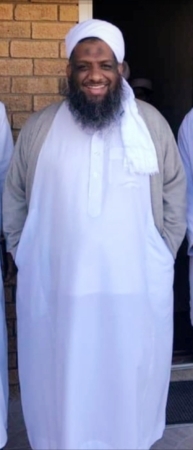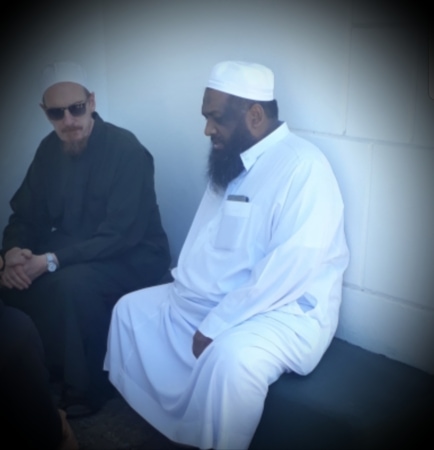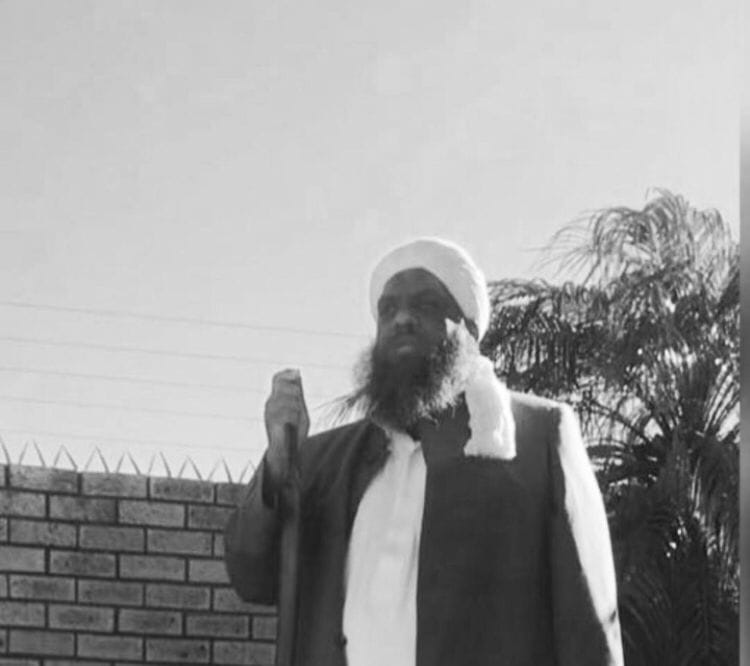The Setting of the Cape Sun: A Tribute to Mufti Taha Karaan
By Dr Yusuf Patel
As the sadness and grief of losing the Cape’s prodigious son sets in, the bitter reality and sequelae of separation between teacher and student inundates scores of graduates of Mufti Taha Karaan around the globe. Incessant and astonishing tributes, reflections, and anecdotal accounts reflect the sordid and sombre emotions that cloud the individual souls and collective consciousness of his close associates and admirers.
The departure of his life has caused eyes to copiously tear rivers for days on end. Perhaps, this is the only avenue for his students and colleagues to ease the burden of his loss and to allow the process of bereavement to take its course. This emotional catharsis is best encapsulated by Shakespeare on the tongue of Richard in his play Henry VI Part 3:
“To weep is to make less the depth of grief.”
There is no shame in weeping, especially over those who made the world a better place through their illuminative existence and diligent work.

We will all miss Mufti Taha Karaan, those who knew him, and those who wish they had. However, despite the great loss that has befallen the Ummah through his passing, let us remember and be inspired by the noble life that he lived. Perhaps, in this, we might find some solace and impetus to continue our own journeys in serving God and his creation.
Mufti Taha Karaan possessed an amazing affinity for knowledge and scholarship. Since his early years growing up, he was known to be an avid reader, voracious bibliophile, and an eloquent poet. Gifted with a photographic memory, he would retain anything he read and would be able to recall it without any mental effort or struggle. Skillful with his hand, he was considered a creative virtuoso in calligraphy and Islamic penmanship. Despite being considered a genius within the Islamic sciences at a tender young age, he displayed maturity beyond his years with his fervent desire to make applicable the knowledge that he acquired. He was never shy to tackle any contemporary issue, always looking to bridge the gap between the sacred and secular. I remember as if it was yesterday, my first interaction with him as a student. It was in a class scheduled for the senior students of the seminary, where he would be explaining and clarifying specific nomenclature within the Shafi’i school of thought. I sat there as a junior student, hoping I would be able to follow this advanced class. As soon as he commenced, I was in awe of his ability to navigate the Islamic and western traditions with great depth and breadth. He would quote Socrates, Kant, Milton, and Shakespeare, amongst others, to consolidate various teaching points within the class. It was there and then that I realised that our community did not truly appreciate the remarkable scholar that he was. His intellectual ability was second to none and something rare to witness in the modern world. However, as much as we loved to benefit from his classes, it was his magnanimous and generous heart that we treasured the most.
Many people attain greatness in their intellectual endeavours, but very few can match their mental capacities with an exalted character of humility and a genuine concern for others. Mufti Taha was one of those saintly individuals. He would go out of his way to ensure that the personal problems and social quagmires of people were resolved and taken care of. Many a time, he would take from his own finances and gift it to others to ensure that they were not in a position of difficulty or strain. To him, knowledge and action were inextricable. He had a great predilection to act upon what he knew. A lover of hadith, he would find every opportunity to actualise and bring to life a prophetic narration. His ardent love of the Prophetic family and noble companions was evident in his writings, poems, and statements. He was a man who exuded harmony and balance in all of his affairs. As an exemplar of scholarly concinnity, he always acted and advised others to follow a path of equilibrium.
Many people ask what the secret to his erudite and sagacious scholarship was. Many reasons could be proffered, but to me, it was his sophisticated simplicity. Mufti Taha conducted himself in the most unpretentious of ways. He had the opportunity to use his profound scholastic pedigree to solicit fame and monetary incentives. However, he preferred a life of anonymity. He was never concerned about gracing the courts of kings and rulers; instead, he found immense satisfaction in spending time with scholars, his students, and those who sacrificed their time for others. He showed us all what true sincerity means and how it should be applied within our lives. The amount of effort that many of us expend in seeking recognition and social reputation, he would use that same amount and more to shun admiration and praise. His uncontrived humility and sincerity were his divine keys which allowed him to unlock the vistas of knowledge that others only dream of.

He was a principled man who opposed oppression in all its forms. He was never shy or apprehensive to stand and support the meek and oppressed. He had a deep concern for the welfare of all people. Despite the vociferous and vexatious attacks on his character and scholarship from various quarters, he stood firm with his legal edicts of protecting society at large through proactive measures in religious spaces. He called for calm and repose during these challenging times, asking the broader community to trust the medical experts within the South African Muslim community regarding the inimical dangers of Covid-19. He refused to be detracted and swayed by aspersions and ridicule, many a time reminding his students not to respond to those hurling abuse and vitriol at him. As always, he was a man with purpose leading from the front with courage and fortitude. The great void that he leaves is irreplaceable, and it bears testimony to the fact that he made the world a better place with his contributions and knowledge. Even though our teacher has departed, and we will miss him dearly, let us find inspiration and motivation from the sublime path that he walked. As Henry Wadsworth Longfellow says in his Psalm of Life:
Lives of great men all remind us
We can make our lives sublime,
And, departing, leave behind us
Footprints on the sands of time;
Footprints, that perhaps another,
Sailing o’er life’s solemn main,
A forlorn and shipwrecked brother,
Seeing, shall take heart again.
Let us, then, be up and doing,
With a heart for any fate;
Still achieving, still pursuing,
Learn to labor and to wait.
The life and death of Mufti Taha Karaan are laden with valuable lessons and reminders. He showed us how to live meaningful lives through knowledge and service. His death reminds us that we will all return to Allah; what is important, though, is that we return with a sound heart. That is how Mufti Taha Karaan returned to his Lord.
May Allah elevate his rank and afford him the highest abode in Paradise with the Prophet (May peace and blessings be upon him).
الغُصْنُ يُنْبِتُ غُصْنًا حِيْنَ تَقْطَعُهُ
وَاللَّيْلُ يُنْجِبُ صُبْحًا حِيْنَ يَكْتَمِلُ
سَتُمْطَرُ الْأَرْضُ يَوْمًا رَغْمَ شِحَّتِهَا
وَمِنْ بُطُوْنِ الْمَآسِيْ يُوْلَدُ الأَمَلُ
A branch when cut
lets a new branch grow
When the night is full
it brings morning forth
The earth will have rain
though it may be scarce
And from the depths of tragedy
new hope is born
– Translated by Mufti Taha Karaan RA
Recommended Readings
Articles by Mufti Taha Karaan
- Guidance on COVID-19 (Part 1) – Mufti Taha Karaan
- Adhering to the National Lockdown – Mufti Taha Karaan
- Understanding the Trends in Fiqh Literature – By Mufti Taha Karaan
- If Only Someone Else Said it | Mufti Taha Karaan of South Africa
